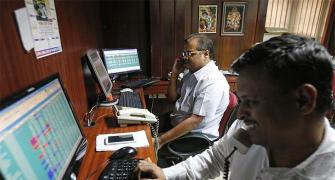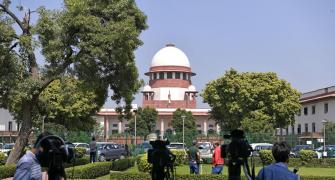The National Democratic Alliance, led by Atal Bihari Vajpayee, had set a scorching pace of reforms in the first two years of its rule. With the voters' mandate for the 13th Lok Sabha pointing to a Congress-led coalition, it seems the reforms process has flattered to deceive.
The Vajpayee government paid considerable attention to infrastructure in the first 2-3 years, especially the roads and the telecom sector.
Reforms jitters as another coalition takes shape
It sorted out the mess in the telecom sector by ushering in the unified licensing regime. It also earmarked Rs 58,000-crore (Rs 580 billion) for the ambitious National Highway Development Programme.
The Golden Quadrilateral -- the first phase of the NHDP project, entailing the construction of 5,846 km roads -- is set to be completed by December.
Simultaneously, the government also moved ahead with its plan to build a North-South and East-West corridor and announced plans to connect state capitals. It realised the importance of ports and the shipping sector in the last year and announced the Rs 100,000 crore (Rs 1,000 billion) Sagar Mala project.
On the civil aviation front too, the government promised an open skies policy in the fag end of 2003-04. It did away with passenger fees and charges and halved the excise duty on aviation turbine fuel to 8 per cent.
Airport privatisation too picked steam only in the last 3-4 months, but a comprehensive civil aviation policy is still awaited.
In the oil sector, the government successfully dismantled the administered price mechanism. A legislation to put in place a petroleum regulator was also introduced but withdrawn later.
The prices for natural gas are yet to be finalised. The government's influence is still visible in oil prices, where it is suspected that state-owned oil marketing companies are never allowed to link oil product prices to the import parity.
In the first 2-3 years, the government also tried to push reforms which, according to former Finance Minister Yashwant Sinha, were either politically sensitive or required the support of state governments.
An amendment to the Land Ceiling Act, changes in labour laws to attract foreign investment, introduction of a pan-India Value-Added Tax regime and reduction of government ownership in public sector banks are issues that the NDA government was still grappling with.
The government, nevertheless, pushed through some pathbreaking articles of legislation, including the Fiscal Responsibility and Budget Management Bill and the Electricity Bill. While the FRBM Bill remained stuck in Parliament for over three years, the Electricity Bill also took over a year to be enacted.
The NDA government also liberalised foreign investment norms and increased foreign direct investment limits on various sectors including petroleum, broadcasting and media.
The cap on FDI in telecom, however, continues to be 49 per cent. The fiscal and economic performance leaves much to be desired. The fiscal deficit of the Centre and states is over 10 per cent of the GDP and is bound to hit growth prospects in the medium to long term.
The urgency of cutting down food subsidy by restructuring the operations of the Food Corporation of India, and strictly following the recommendations of the Commission on Agricultural Costs and Prices on the minimum support price too have been ignored.
On tax reforms, the government reduced peak customs duties to 20 per cent in line with its commitment to bring it to south Asian levels.
It also rationalised excise rates at 16 per cent Cenvat. Procedural reforms in direct taxes were ushered in like outsourcing of PAN card issuances, quick refunds and allowing individual assessees to file their Income-Tax returns with select banks.
The government, however, paid lip service to the Vijay Kelkar task force on direct taxes and did not touch upon the tricky and politically sensitive issue of tax exemptions.
It did not pay much attention to the far reaching recommendations of the Expenditure Reforms Commission.
It also took over four years to undertake pension reforms. Licences are yet to be issued to any pension fund manager though government recruits from this year will not get any assured pension but will instead make a defined contribution towards pension.
While the external sector looks strong with huge foreign exchange reserves of $120 billion mark, it has simultaneously raised concerns about the cost of maintaining such reserves.






